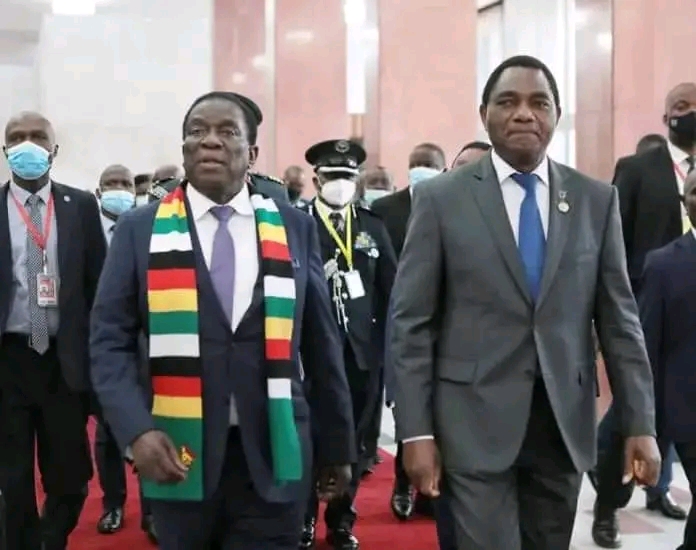By: The Editor-in-Chief
The ongoing diplomatic tensions between Zambia and Zimbabwe highlight the complex web of regional politics in Southern Africa. Zambia’s call for intervention by the Southern African Development Community (SADC) and the African Union (AU) underlines the nation’s commitment to regional stability and sovereignty.
Historically, Zambia has played a pivotal role in supporting the liberation movements within the region, acting as a sanctuary and strategic base for neighboring countries striving for independence. This legacy of solidarity and support is a cornerstone of Zambia’s regional identity and speaks to the importance of mutual respect and cooperation among Southern African nations.
The current dispute stems from a video released by Moscow, showing Zimbabwean President Emmerson Mnangagwa accusing the United States of leveraging its relationship with Zambia to isolate Zimbabwe. Mnangagwa’s appeal to Russian President Vladimir Putin for support in defense and security further complicates the geopolitical landscape.
Zambia’s Foreign Affairs Minister Mulambo Haimbe’s response, emphasizing Zambia’s sovereignty and the need for a mediated resolution, reflects a prudent approach. However, the historical and personal ties between President Hakainde Hichilema and Zimbabwean opposition leader Nelson Chamisa add another layer of complexity. Hichilema, who endured years as Zambia’s longest-serving opposition leader, shares a bond with Chamisa, which Zimbabwe perceives as threatening.
Mnangagwa’s allegations and the subsequent strain on bilateral relations can be viewed through the lens of regional power dynamics and the enduring influence of historical alliances. Zimbabwe’s accusations of Zambia supporting its opposition are not new, but they are intensified by the personal rapport between Hichilema and Chamisa.
The involvement of SADC and the AU is crucial in ensuring that this diplomatic rift does not escalate further. These regional bodies have the authority and responsibility to mediate and foster dialogue, aiming for a peaceful resolution that honors the longstanding tradition of cooperation and mutual support in Southern Africa.
As Zambia continues to navigate its role as a regional leader, it must balance its historical legacy with contemporary diplomatic challenges. Upholding the principles of sovereignty and mutual respect, while engaging in constructive dialogue through regional mechanisms, will be key to maintaining stability and fostering positive relations in the region.
In these times of tension, it is imperative for Southern African nations to remember their shared history and the collective struggle for independence, using it as a foundation for building a harmonious future. The spirit of unity and collaboration that once drove the region towards freedom must now guide it towards sustainable peace and development.


